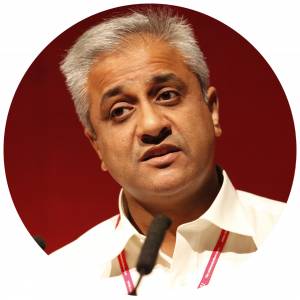CWU Equality Month: The Top Issues Facing BAME Communities In The UK
March 17 2021March is CWU Equality Month
 Week Three of Equality Month is BAME Week, and the focus is the ongoing fight against all forms of racism and prejudice.
Week Three of Equality Month is BAME Week, and the focus is the ongoing fight against all forms of racism and prejudice.
Today, NEC BAME lead Ali Moosa writes about the top issues facing BAME communities and groups in the UK.
People from BAME communities can experience racism in their personal lives, ranging from casual slights to explicit hurtful comments and verbal or physical aggression. Research suggests that experiencing racism can be very stressful and have a negative effect on overall health and mental health.
There is a growing body of research to suggest that those exposed to racism may be more likely to experience mental health problems such as psychosis and depression.
BAME communities are also often faced with disadvantages in society. They are more likely to experience poverty, have poorer educational outcomes, higher unemployment, and contact with the criminal justice system, and may face challenges accessing or receiving appropriate professional services.
Many groups face inequalities in physical and mental health. This can be due to factors like disability, sexuality, gender and age. In order to understand different BAME communities’ experiences of mental health problems and of services provided, it is also necessary to consider these other aspects in addition to race and ethnicity, which create an additional disparity for BAME groups.
Death rates from COVID-19 were highest among people of black and Asian ethnic groups. There is also a disparity in COVID-19 mortality between ethnic groups.
An analysis of survival among confirmed COVID-19 cases and using more detailed ethnic groups, shows that, after accounting for the effect of sex, age, deprivation and region, people of Bangladeshi ethnicity had around twice the risk of death than people of white British ethnicity. People of Chinese, Indian, Pakistani, other Asian, black Caribbean and other black ethnicity had between a 10 and 50 per cent higher risk of death when compared to white British.
BAME staff across all levels of responsibility do not feel they work for organisations that are open, fair and inclusive. Lack of BAME role models at senior level is demoralising for those who are committed and want to progress. They see leadership that is not diverse and perceptions of an ‘old boys club’ persist. Many feel it is still the case that progression is based on whether ‘your face fits’ and this does not equate to organisations that are committed to values of diversity.
The lack of an explicit, clearly and consistently communicated diversity and inclusion strategy compounds the view that the society is not committed to ethnic diversity.
Unconscious bias and discrimination persist, which can block the progress of talented BAME staff and mean there is not always equal access to promotions, projects, senior leaders and secondments. All of this limits the aspirations and success of BAME staff.
There is no reason why every organisation in the UK should not have a workforce that proportionately reflects the diversity of the communities in which they operate, at every level. This is what our collective goal should be.
This March is Equality Month at CWU and we will be hosting a range of events, workshops and courses to celebrate. See the full programme (some details to be added throughout the month) and register for our online events.


